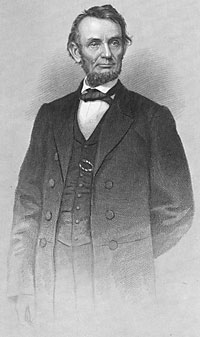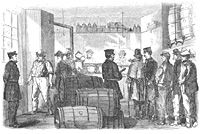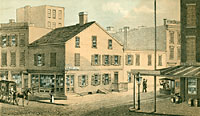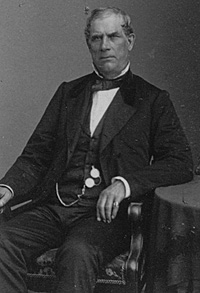
Abraham Lincoln

Scene at the Polls in the Five Points

Old House, Corner of Houstin and Cannon Streets, 1864

Thurlow Weed
Thurlow Weed’s control of the Union state committee proved a very handy weapon in the fight for Lincoln’s renomination. In February, 1864, when the Radical friends of that perennial candidate, Salmon P. Chase, were temporarily absent, an endorsement of the administration was adopted by the committee. A few weeks later a majority of its members signed an open letter expressing their confidence in and support of the President,” wrote Weed biographer Glyndon Van Deusen.1 The committee was stimulated to action by New York Postmaster Abram Wakeman, who wrote a letter which was shown to President Lincoln:
I returned from Albany last evening— Our State Committee met there on Wednesday— A strong effort was made to induce the Committee to pass a resolution requesting the National Committee to reconsider the time for the meeting of the National Convention until September next-
This was passed by the Fremont men and all others opposed to Mr. Lincoln, and was with difficulty prevented— It resulted, however, not only in their not passing any such resolution, but I succeeded in inducing the Committees to sign an autograph letter addressed to the President, pledging him their continued support &c &c.
This was signed by every member of the committee present and will be speedily forwarded to the President—
I deemed this something accomplished in the right direction—
The Legislature are reluctant to act, yet I have commenced an effort which I think will result favorably— 2
Meanwhile in February, according to historian Sidney David Brummer, “a number of wealthy and prominent Unionists of New York City sent out a circular to the ‘Loyal Citizens of the United States,’ lauding Lincoln and proposing that all in favor of his renomination should hold on February 22nd in their respective localities meetings to that end. However, these demonstration did not take place in New York City or elsewhere, for the move seems to have been regarded as premature. At the beginning of February, ‘Lincoln Clubs’ began to be formed in the various wards of the City. Two associations having the same object were also organized there, one of them, the ‘Central Union Club’ being especially active. Its leading spirit, was Simeon Draper, a politician of local note and later collector of the port. In March the Kings County Republican General Committee endorsed Lincoln and his administration. But the President’s adherents obtained no such approval from the Legislature.”3
Historian William Frank Zornow wrote: “During March an appeal was prepared in New York and sent to the Union National Committee calling for the postponement of the convention until September 1. Greeley and Bryant were active in directly the work of this committee which prepared the appeal; and their efforts were most thorough if one judges by the impressive list of names appended to the document. ‘This list,’ crowed Greeley, ‘contains the names of two thirds of the Unionists chosen to our present State Senate, the absence of others prevented their signing. We understand that but two Senators declining to affix their names.’ Henry Raymond’s Times denounced the appeal as nothing more than a cheap electioneering trick of the Unconditionals to defeat the President’s nomination. John Forney also took the defensive in favor of the June 7 date for the convention in editorials in his papers, but in private conversations he often agreed that a postponement would be better. The whole affair in New York, however, collapsed in its own insignificance when the Union National Committee refused to take cognizance of the appeal, which had been made on March 25.”4
Weed had opposition, noted historian James G. Randall: “Eminent men in New York, including W. C. Bryant and George Opdyke, joined in a published statement (March 25, 1864) objecting to the seventh of June as the date of the coming national convention. These men — an impressive list — argued that unity for a single candidate was important but that such unity could not be reached at the early date named. Events in the spring and summer should be awaited, for upon them would ‘depend the wish of the people to continue in power their present leaders, or to change them for those from whom they may expect…more satisfactory results.'”5 In addition to Bryant and Opdyke, noted historian Sidney David Brummer, the signatories included “two-thirds of the Unionist members of the state Senate.”6 In Washington, Attorney General Edward Bates noted in his diary that “It is not unnatural that [the] Post should wish delay. It needs all the time it can get, to hunt up some candidate to supersede Lincoln. Since Mr. Chase retired, the anti-Lincoln men fear nothing more than to be forced to choose, until they have tried all chances for a new candidate. The N[ew] Y[ork] Tribune begs for time.”7
Historian Brummer wrote: “In April, the fact of Chase’s withdrawal from the presidential canvass became known. The question then turned to whether the radical strength could be concentrated on Fremont. The centers of the movement in his behalf were St. Louis and New York. It was the Central Fremont Club of New York City that joined the St. Louis radicals at the beginning of May in issuing the call for the Cleveland convention. In the middle of May, there was issued another call for the same object, and among the New York men who signed this document were state Comptroller Robinson, Attorney-General Cochrane, ex-state Senator Andrew J. Colvin, and Thomas B. Carroll, long a prominent and ardent anti-Weed man.”8
Biographer Glyndon Van Deusen wrote: “Weed’s efforts were aided by the collapse of trial balloons flown for Chase, Fremont and other candidates, and when the Union state convention met on May 25, he had no difficulty in obtaining an endorsement of the national administration and an expression of preference for Lincoln’s renomination. It was what Weed termed a thoroughly satisfactory gathering.”9 Randall wrote that “despite political cross currents and intraparty feuds, the strength of organized Republican support was decisively added to the Lincoln cause. Though the Tribune, the Independent, and the Post worked against Lincoln in the prenomination phase, and though a huge meeting was held in favor of Grant, such men as Henry J. Raymond, Edwin D. Morgan, and Thurlow Weed held the Republican forces together for the President, and the state convention of the party, meeting at Syracuse on May 24, resolved by acclamation to approve the Lincoln administration and to favor his renomination.”10
Historian Reinhard H. Luthin wrote: “Weed’s chief lieutenants at Syracuse were postmaster Abram Wakeman of New York City and Postmaster George Dawson of Albany, a co-editor of Weed’s paper. ‘A glance at the list of delegates to the Republican state convention,’ angrily observed the Democratic Atlas & Argus of Albany, ‘will satisfy anyone that the people have had nothing to do with their selection, and that they represent only the great army of office-holders in our state. From every county come the internal revenue collector, the assessor, the sub-collectors, the provost marshal or his deputy, and the city and village postmasters.'”11
New York Secretary of State Chauncey M. Depew later recalled: “There was an active movement on foot in the interest of the secretary of the treasury, Chase, and fostered by him, to hold an independent convention before the regular Republican convention as a protest against the renomination of Mr. Lincoln. It was supported by some of the most eminent and powerful members of the party, who threw into the effort their means and influence. After these victories the effort was abandoned and Mr. Lincoln was nominated by acclamation. I recall as one of the excitements and pleasures of a lifetime the enthusiastic confidence of that convention when they acclaimed Lincoln their nominee.”12
Still, the New York convention “witnessed a spirited struggle between conservatives and Radicals,” wrote historian James A. Rawley. “Yet the convention’s outcome was an endorsement of Lincoln; happily, for as Morgan said, ‘The State of New York’s voice will, in all probability, be potent.”13 According to historian Brummer, “By the time the Union State Convention met at Syracuse — May 24th — Lincoln’s strength with the mass of the party was so apparent that the convention adopted by acclamation and with hearty cheering a resolution approving his administration, ‘recognizing his integrity and patriotic efforts to suppress the rebellion,’ and expressing ‘its preference for his renomination. Thurlow Weed, Horace Greeley, Henry J. Raymond, and Roscoe Conkling were the big lights in attendance. The rivalry between the two wings of the party broke forth because of the presence of two delegations — both, however, represented as earnestly favoring a second term for Lincoln — respectively chosen by the Seward and radical organizations of New York City.”14The split in the party was reflected by the vote on the four statewide delegates to the Republican National Convention the next month in Baltimore. Two Seward-Weed delegates were elected: Henry J. Raymond and former Senator Preston King. Two anti-Weed delegates were chosen, both former Democrats: Daniel S. Dickinson and Lyman Tremaine.
Footnotes
- Glyndon Van Deusen, Thurlow Weed: Wizard of the Lobby, p. 307.
- Abraham Lincoln Papers at the Library of Congress. Transcribed and Annotated by the Lincoln Studies Center, Knox College. Galesburg, Illinois. (Letter from Abram Wakeman to Montgomery Blair, March 25, 1864).
- Sidney David Brummer, Political History of New York State During the Period of the Civil War, p. 375-376.
- William Frank Zornow, Lincoln & the Party Divided, p. 60-61.
- James G. Randall, Lincoln the President: Last Full Measure, p. 119.
- Sidney David Brummer, Political History of New York State During the Period of the Civil War, p. 377.
- Howard K. Beale, editor, The Diary of Edward Bates, p. 344-345 (March 13, 1864).
- Sidney David Brummer, Political History of New York State During the Period of the Civil War, p. 377-378.
- Glyndon Van Deusen, Thurlow Weed: Wizard of the Lobby, p. 307.
- James G. Randall, Lincoln the President: Last Full Measure, p. 123.
- Reinhard H. Luthin, The Real Abraham Lincoln, p. 509.
- Chauncey M. Depew, My Memories of Eighty Years, p. 63-64.
- James A. Rawley, Edwin D. Morgan, 1811-1883: Merchant in Politics, p. 198.
- Sidney David Brummer, Political History of New York State During the Period of the Civil War, p. 379.









